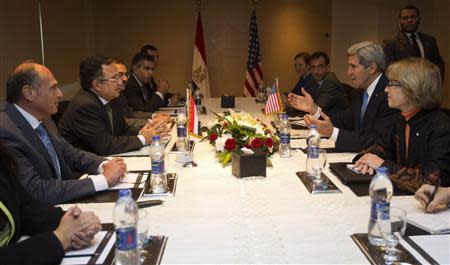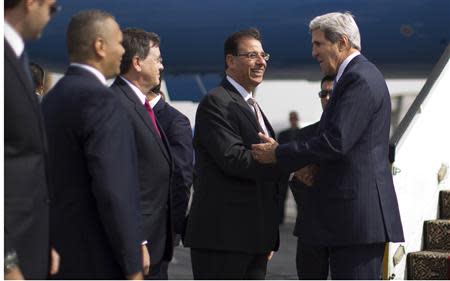Kerry sees signs Egypt moving back towards democracy
By Lesley Wroughton and Shaimaa Fayed CAIRO (Reuters) - A day before Egypt's deposed Islamist president goes on trial, U.S. Secretary of State John Kerry on Sunday expressed guarded optimism about a return to democracy in the country during a tour partly aimed at easing tensions with major Arab powers. On his first visit to Egypt since the army removed president Mohamed Mursi in July, Kerry called for fair, transparent trials for all citizens. However, he described Cairo as a vital partner to the United States and the region, as he tried to repair relations hurt by a partial freeze in U.S. aid. Kerry said the relationship between the United States and Egypt should not be defined by aid but by a partnership, and promised to launch talks on a U.S.-Egypt strategic dialogue. Senior State Department officials said Kerry did not raise Mursi's trial in his meetings with interim President Adly Mansour and army chief General Abdel Fattah al-Sisi, the man who deposed Mursi. Instead, he stressed that politically motivated and arbitrary arrests should be avoided and were unacceptable to the United States, according to the officials who briefed reporters. "There was definitely no conscious decision not to raise it," one of the officials said. Referring to his recent comment that the Egyptian generals were restoring democracy when they deposed Mursi after mass protests against his rule, Kerry said: "Thus far there are indications that this is what they are intending to do." Relations between the United States and Egypt have deteriorated since Mursi's overthrow, which unleashed violence in which hundreds have died, even though the government has published a "road map" for an eventual return to democracy. Kerry said the democratic roadmap was "being carried out to the best of our conceptions." The State Department officials said during talks Kerry had stressed the importance sticking to the roadmap's timelines and that stability was essential to rebuild the economy. "NOT A PUNISHMENT" Washington has repeatedly urged the interim government to act with restraint in cracking down on Mursi's Muslim Brotherhood and its supporters. Kerry acknowledged that last month's decision by President Barack Obama to freeze some military aid as well as $260 million in cash, pending progress on democracy and human rights, had not gone down well in Cairo. "We knew that in some places obviously that wouldn't be well received, but it's not a punishment," he told a joint news conference with Foreign Minister Nabil Fahmy. "President Obama has actually worked very, very hard to be able to make certain that we're not disrupting the relationship with Egypt." Egypt has long been the second-largest recipient of U.S. aid after Israel, with the military receiving $1.3 billion a year. However, Fahmy, who emphasized the "turbulent" state of U.S.-Egyptian ties, told Reuters on Saturday that Egypt would look beyond the United States to meet its security needs. Washington has also held up the delivery of four F-16 fighter jets to the Egyptian air force, a subject that was not raised on Sunday, according to State Department officials. In August the army crushed two pro-Mursi protest camps and has arrested thousands of Islamist supporters, including many Brotherhood leaders. A court order has also banned the group, Egypt's oldest Islamist movement, and seized its funds. Mursi, who has been held incommunicado since his overthrow, is due to face charges of inciting violence with 14 other senior Brotherhood figures. The State Department officials said Kerry had pressed the interim authorities to persuade the Muslim Brotherhood and other groups that they would be included in Egypt's future political system if unrest and rioting by supporters stopped. SAUDI STRAINS Kerry arrived in Saudi Arabia late on Sunday, a major donor to Egypt's interim army-backed government, where he was met by Saudi Foreign Minister Saud al-Faisal. The kingdom has become frustrated with Washington perceived inaction in Syria, its diplomatic engagement with Iran and lukewarm attitude toward the military-backed government in Egypt. Kerry meets King Abdullah on Monday, his first since becoming America's top diplomat in February. It will also be his first visit since a senior Saudi prince last month warned that the kingdom could "shift away" from the United States, suggesting a major strategic change after decades of close military and economic cooperation. In Washington, officials saw the threat as mostly rhetoric. The White House has shown an increased willingness to risk strains with allies to pursue U.S. goals of avoiding military intervention in Syria and seeking a nuclear deal with Iran, Saudi Arabia's chief regional rival. A senior State Department official, who requested anonymity, played down suggestions of a major rift with Riyadh. However, the official acknowledged that Saudi Arabia opposes any Iranian participation in proposed Syria peace talks to end its 2-1/2 civil war. In addition, the Saudis expressed concern over Washington's recent talks with Iran about its nuclear program, according to the official. In Cairo, Kerry downplayed the severity of differences between Washington and some of its allies. "For instance there are some countries in the region that wanted the United States to do one thing with respect to Syria and we have done something else. Those differences on an individual tactic on policy do not create a difference on the fundamental goal of the policy," he said. Kerry will make clear to the Saudis that Iran would not be welcome to attend the Syria peace talks in Geneva unless it endorsed a past agreement that would see Syrian President Bashar al-Assad give up power, the official noted. "Iran has not done that, and without that even we couldn't consider the possibility of their participating," the official added, stressing: "It is a question of just making sure they understand the details of how firm our position is." On ending the stalemate with Tehran over its nuclear program, the official said: "We frankly completely agree with the Saudis about their concerns." In addition to Riyadh, Jerusalem and Bethlehem, Kerry will make stops in Jordan, the United Arab Emirates, Algeria and Morocco. (Writing by Lesley Wroughton and Yara Bayoumy; Editing by David Stamp and Will Waterman)





